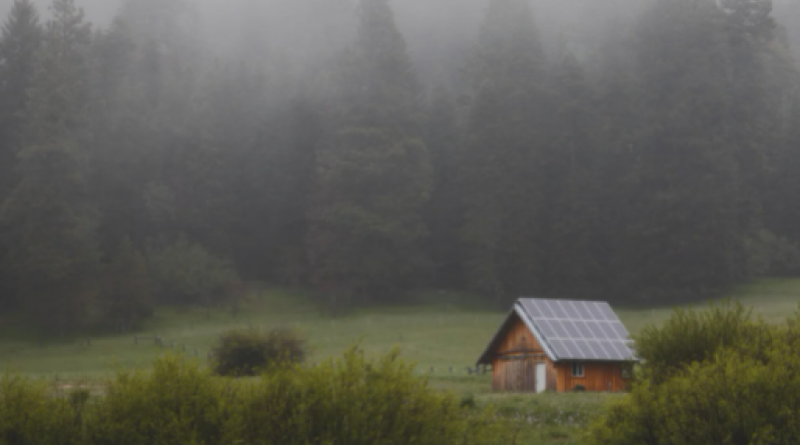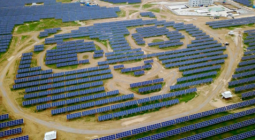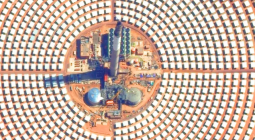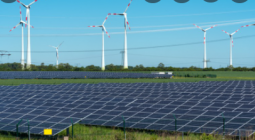Can You Go Off-Grid With a Solar Energy System? (2022)

We discuss benefits, shortcomings and what you'll need to go off-grid.
I think I speak for everyone here at EcoWatch when I say I've dreamt of living off the grid. Imagine being completely self-sufficient, impact-free and unrestricted by society at large. Even if this thought hasn't crossed your mind, I imagine going off-grid interests those plagued by high energy costs, or those building their own cabin, shed or other DIY solar project.
The way we generate and use energy has shifted dramatically over the last decade. With solar panels and battery storage technology advancing as quickly as it has, the discussion around off-grid living has become much more complex. What does living off the grid mean? Can you go off-grid with solar? Is it legal?
It's not quite as simple as just flipping your breaker panels off, as there are safety concerns, legal considerations and greedy energy corporations to take into account. Let's dig in.
What Does Going Off-Grid Mean?
In theory, living off-grid means you live independently from public utilities, meeting 100% of your own energy needs on-site. Most commonly, this is achieved using solar energy.
Public utilities are the companies that supply you with the energy, water, gas or other services you use in your home every day. The public infrastructure supporting these utilities has been in place for hundreds of years, and it encompasses the production, transportation and distribution of energy throughout a region or community. Any adjustments to this infrastructure require permitting and inspections (and often fees) so that the rest of the grid stays stable and safe.
But now that so many localized renewable energy options are available, people are realizing we can decentralize the power grid. This would eliminate a great deal of public costs — both financial and environmental — surrounding energy and infrastructure. In this article, we'll approach going off the grid from a big-picture perspective, but off-grid living can also mean something more simple, such as independently powering a cabin, shed or vacation home.
Is it Legal to Live Off-Grid?
This is where the conversation gets interesting. Public opinion differs on the legality surrounding off-grid living. In most cases, living off the grid as we know it is done in rural areas more out of necessity than choice. Within more densely populated areas, many jurisdictions require their residents to adhere to local building codes and zoning restrictions, both for safety and for public image.
As a result, you may be legally required to maintain a connection to your city's power grid or sewer systems. Failure to comply with these local ordinances can result in fines or seizure of land or property.
Before renewable energy generation became possible for individual homes, there was really no reason to want to be disconnected from your local utilities. But now that homeowners are capable of generating their own electricity, will the legality of off-grid living change?
Homes with modern solar technologies and solar battery systems are likely to meet all the legal requirements to operate safely and reasonably without connection to outside power sources. With public opinion about outdated utilities beginning to sour, we may start to see modern off-grid living become more widely accepted.
Even if it is already legal to live off-grid in your state or area, remember you'll have to file for the proper permits and inspections before you can completely cut the cord. If you're looking into living off-grid, we advise you to consult your state, city or county to learn about any legal restrictions, permits or fees.
For the sake of discussion, let's proceed on the assumption that you are legally allowed to live disconnected from your public utilities and you've secured any necessary permits to do so.
What Do You Need To Live Off-Grid?
What makes going off-grid unfeasible for some is that their homes weren't built with self-sufficiency in mind. Meeting all of your energy needs on-site necessitates smart planning — energy efficiency, an unobstructed south-facing roof, good insulation and more. The needs of living efficiently go far beyond the question "how many solar panels do I need to live off-grid?" (though that's a valid thing to ask as well).
Solar Panels
Let's say you have a nice south-facing roof that's perfect for a solar array. Even if you packed that roof to the gills with solar panels, you'd still only be able to use that energy while the sun is shining, and the majority of it would actually go to waste.
Energy Storage
This is where backup batteries come into play. The concept is simple: You connect batteries to your home's solar panels that store the excess energy they generate during the day. This allows you to spread out the usage of the energy your panels generate.
But how many batteries do you need to be completely self-sufficient? Even with a battery as powerful as the Tesla Powerwall, most homes need at least two to three batteries to reliably store all the energy necessary to keep a home powered off-grid. (For context, Tesla Powerwalls are about $10,000 each.)
Energy Efficiency
Designing or retrofitting a home to be energy efficient can sometimes save homeowners just as much as installing solar panels. If you're designing an off-grid project, prioritize energy-efficient lighting and other appliances to minimize the number of solar panels you need to power your property.
Other Solar Equipment
In addition to panels, batteries and efficient appliances, homes with solar and storage require wiring, charge controllers, inverters, mounting and safety equipment. Most of these can be provided by any solar company (if you're hiring someone to install your system), but if you're set on a DIY solar project, you'll need to acquire all of the above.
Pros and Cons of Going Off-Grid With Solar
Of course, there are a few pros and cons of solar energy to consider when deciding whether to go off the grid.
Pros include:
- Saving money: With the costs of solar and storage as low as they currently are, most homeowners can save tens of thousands of dollars when they generate their own energy instead of relying on public utilities.
- Avoiding utility fees: As outdated utilities struggle to make money, many add fees to the bills of customers who install solar on their properties. If you're not part of the power grid, you can avoid these fees.
- Lowering your impact: Generating your energy with solar, whether on or off the grid, offsets the harmful effects of generating and distributing conventional electricity.
- Increasing your independence: Living with solar allows you to take control of your energy use. With energy independence, you can more accurately predict your energy use and energy costs and free yourself from rising utility rates.
Cons of going off-grid with solar include:
- You don't have a backup: To live reliably off-grid, you generally require a system that can provide three to four days' worth of electricity in case of long stretches of cloudy days, changes in your energy use or extreme weather events. Retaining a connection to the grid can provide some peace of mind that you'll never be left in the dark when things don't go as planned.
- You may pay unnecessary expenses: As mentioned, when living off-grid, you need to ensure your maximum energy use is covered rather than your average energy use. This can make the process more expensive than maintaining a grid-tied system would be.
- Utilities are always changing: Before saying goodbye to your power company, remember that people can change! Though the changes are coming slower than many may prefer, utilities are shifting toward generating clean energy with a localized approach, which will reduce costs, emissions and power outages in the future.
Final Thoughts
Electrical systems around the world are undergoing rapid changes as we confront the climate crisis and expand our infrastructure. Going off-grid may seem like a satisfying idea, but in reality, it may be too complex for projects larger than a small cabin or shed.
Sooner than seeing homeowners going fully off-grid, we hope to see more promotion of decentralized energy generation through things like:
- Partial grid-reliance via solar: The most common solar option, partial-grid reliance keeps you connected to the grid — but you meet most of your energy needs with solar and storage anyway.
- Community solar initiatives: You can join a community solar project by purchasing a share or by paying a subscription. The electricity production that corresponds to your ownership percentage or subscription level will be measured and subtracted from your power bills each month.
- Smart grids and microgrids: Large apartment complexes or commercial buildings can operate on their own microgrids, capable of disconnecting from the main local grid during an outage and powering themselves via solar and stored energy.
The benefits of a decentralized clean energy system are many: reliability, lower costs, more autonomy and decreased emissions. Every home that installs solar lowers the strain on public infrastructure, which in turns lowers bills and promotes stability in the rest of the community.
So, what's the moral of the story? Keep things local, and only go off-grid if you have to.
Karsten Neumeister is a writer and renewable energy specialist with a background in writing and the humanities. Before joining EcoWatch, Karsten worked in the energy sector of New Orleans, focusing on renewable energy policy and technology. A lover of music and the outdoors, Karsten might be found rock climbing, canoeing or writing songs when away from the workplace.
November 2021
EcoWatch




